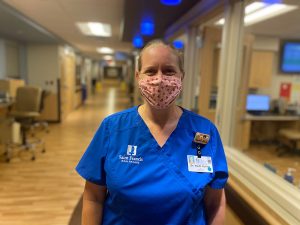
Heidi Jo Hunter, MD
Rehabilitation physician Heidi Hunter, MD, at Saint Francis Healthcare System has helped hospitalized COVID-19 patients since the start of the pandemic. She shares her unique insights as a frontline healthcare hero and her knowledge of the COVID-19 vaccine.
What is your role as a physiatrist?
“It is [the ICU doctor’s] job to save their life; it is my job to make it worth living. I rehabilitate patients who have been through catastrophic conditions such as COVID. My goal is to restore patients to some normalcy in their life whether that is work, home life, driving or school. As a rehab department, we think outside the box to get patients back to as close to 100 percent as possible.”
As a physiatrist, what have you experienced during the pandemic?
“In rehabilitation, we take care of the worst-of-the-worst COVID patients. COVID upended the lives of these normally healthy patients in a very short amount of time. Some patients who were sick in the hospital for 30 days will take the next year to recover. A lot of the COVID patients need physical, occupational and speech therapy as well as pulmonary rehab to rebuild endurance. We determined a rehabilitation unit was needed within our COVID Care Unit to get patients on the road to recovery as quickly as possible. My team stepped up – volunteering to go to the COVID Unit, working overtime and whatever it took to improve the lives of these patients.”
What long-term effects have you seen in patients due to COVID?
“Some patients never recover from COVID and will have long-haul complications. We are seeing long-term cognitive deficits, neuropathy (numbness), ongoing weakness, shortness of breath and other symptoms. Some stay on oxygen therapy for a long time even though they had no prior pulmonary issues.”
Why does COVID impact people differently?
“We don’t have all the answers yet as to why some patients recover, why some patients never get hospitalized or why some plummet and take a huge nosedive. This is a big reason why everyone should be vaccinated. Some may feel protected because they consider themselves younger and healthier, but that is not always the case.”
What are your thoughts on public apathy?
“Even though the new variant is spreading, people unfortunately still feel very comfortable. They are tired of wearing masks, missing loved ones and vacations and ultimately want their normal lives back. But, if people are unknowingly infected, in public, unmasked and spreading the virus, COVID could run rampant again. The way to protect yourself is to become vaccinated.”
What would you say to someone who is apprehensive about being vaccinated?
“To me, the vaccine is a no-brainer. We took the world’s smartest scientists and gave them the money and resources to produce something; they know what they are doing. We as physicians would not promote something if we felt it was unsafe. “
What would you say to those concerned about the quick turnaround in production of the vaccines?
“We have been making vaccines and giving vaccines for a long time. This is no different. The way I look at this is: We took away government red tape to speed things up. The government stepped back and said, ‘Hey scientists, do what you need to do to get this under control.’ ”
If I have already had COVID, do I still need to be vaccinated?
“My recommendation is to get the vaccine whether or not you have had COVID; however, if you have received monoclonal antibodies for COVID or certain medications while being treated for COVID, we do ask that you wait 90 days and discuss with your physician. Those who had a mild course the first time should also understand that the second reinfection could be significantly more severe.”
What about herd immunity?
“The only way to get herd immunity is to vaccinate a significant portion of the community, and we are still far from that. The way to reach herd immunity is to vaccinate those who are eligible.”
Any closing remarks?
“My recommendation to all of my patients is, unless they have a contraindication, get vaccinated. Saint Francis and its amazing colleagues have worked tirelessly to care for hundreds of COVID patients, administer vaccines and educate our community. At this point, it is up to the people.”
Learn more at SFMC.net/COVID19

